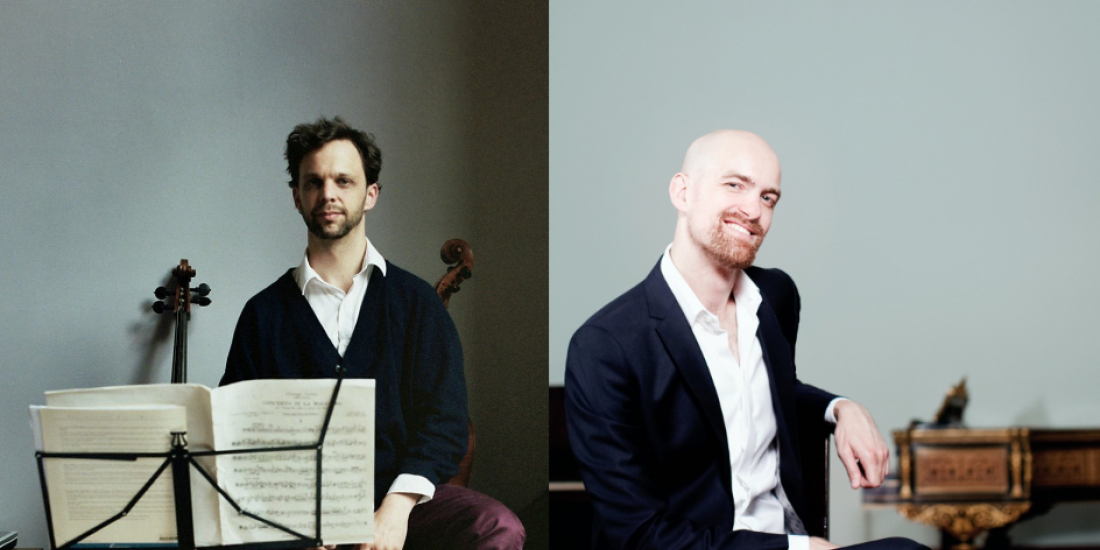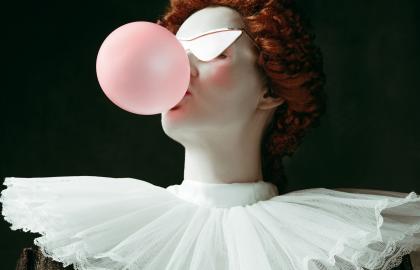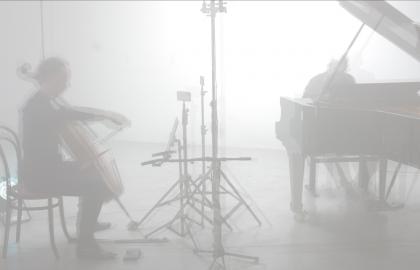Where did you get the idea of combining Bach and Debussy?
Anthony: Honestly, it was Benjamin's idea... [Anthony and Benjamin laugh]. My original intention was a programme dedicated to Bach's cello suites and improvisation. But Benjamin is a very... questioning person. [Benjamin gestures as if to say, "No, he's crazy!" ]. Benjamin pondered the meaning of the Bach Heritage Festival's title. The idea was to highlight Bach's legacy and how it transcends the ages. Benjamin found a wonderful quote in which Debussy refers to Bach and the importance of his music. That was the starting point for this programme.
What is the link between these two composers?
Anthony: We rarely associate the figures of Bach and Debussy, yet there is clearly a link. Debussy was influenced by Bach in many ways. This programme brings together pieces by Debussy that make subtle references to Bach. I find this association very interesting, because it is not obvious at first sight...
Benjamin: We know relatively little about Bach, but his art proves that he liked to push the limits. Nothing forced him to go that far. Nobody asked him to write a cantata a week in Leipzig. But he did. Why? Perhaps he wanted to surpass the music of his predecessors... We know that he constantly reworked his music and was critical of his work and his environment, a great point he had in common with Debussy! In his correspondence and articles, Debussy was also often critical - though certainly more acerbic than Bach. Debussy used criticism to shape his own art. He never took anything for granted and looked for the best in everything, sometimes to the detriment of those around him...
"J.S. Bach, a benevolent God to whom musicians should address a prayer before setting to work, to preserve themselves from mediocrity"
How can Bach's influence be heard in Debussy’s music?
Anthony: In Bach’s music, polyphony is externalised, whereas in Debussy’s it is inside - although very present. The technique of writing and the voice leading is fully mastered, absolutely impeccable. It is particularly evident in Doctor Gradus ad Parnassum, a piece from Children's Corner, which we will perform at the concert. The voice leading is extremely baroque, with four voices perfectly independent of each other. Debussy is rarely referred to as a technician. We more readily speak of his inspiration, of the colours of his music, of Monet and Manet... This is understandable. But Debussy is also a master of technique. By placing him next to Bach, we want to emphasise this aspect.
In his Cello Sonata, Debussy demonstrates great mastery of the form. He refuses to finish the piece without expressing exactly what he wants to say. The way he constantly changes atmosphere and tempo is more reminiscent of an 18th century concerto grosso than a 19th century sonata. This is far removed from a Mendelssohn sonata... This fragmentary, unusual structure is highly baroque in a way.
How did you put together this programme?
Benjamin: Basically, these are pieces that we like.
Anthony: Benjamin and I are both interested in each other's repertoire. We like to overlap our keyboard and cello repertoires. The good thing about Bach is that you can take any part of his work and combine it with another, because Bach himself is hyper coherent.
Benjamin: The duration of a concert is much too short. To do it justice, we would need an eight-hour programme of all the cello suites, the suites with our improvisations, the entire Well-Tempered Clavier – a keyboard repertoire that I play on the cello using a loop station. But we only perform one hour of it. Since we have to choose and reject, we take those works that affect us for life.
For me, the chorale "Ich ruf zu dir, Herr Jesu Christ", in the very strange key of F minor, is one of the most beautiful pieces ever written. It works very well with the energy of Debussy's Élégie, composed by Debussy while he was ill. It is a piece for piano, although composer and oboist Heinz Holliger thinks that it would have been intended for piano and cello but Debussy would not have had time to complete it. I play the left hand part. Ich ruf and Élégie are linked, like brother and sister. Despair and hope. Minor, interior, personal... The personal dimension is fundamental. We don't just perform pieces by dead people.
Anthony: As a performer, by choosing pieces that make an impression on us, we give them new life. Like actors, we need to really feel things ourselves in order to express them.
Benjamin: Is that why you'll be playing the harpsichord as well, Anthony? To find sounds that inspire you?
Anthony: Yes, but it's not so much the sounds I'm looking for as the texture. What is interesting about the harpsichord – I'm thinking in particular of Bach's sonata for viola da gamba or the improvisations around the suites – Is that it allows you to do things that are impossible with a piano. It is the difference between a horse and a car, in that the horse can take us to places that will always remain inaccessible to a car. And the experience of the world is quite different.
Benjamin: That's also why I'll be playing a five-string cello, an instrument to which Bach dedicated his last cello suites, as well as several cantata movements. It has the low register of the cello and the mid-high register of the viola. I find this hybridisation and formal freedom in instrument-making extremely inspiring. It is a change from the current standards! It gives a very individual sound that is almost indefinable. I would say a more metallic sound, a bit like a harpsichord. Sorry, Anthony, if the analogy seems out of place...
Anthony: No, you could say that the harpsichord sounds like a cello, that suits me very well. [Laughs]
Benjamin: The last suite is in D major, a festive key. What's more, Bach widens the register by adding a string, as if he wanted to get closer to God.
In the quotation associated with this programme, Debussy contrasted the mediocrity of his time with the music of Bach. Are his warnings and exhortations also aimed at us?
Anthony: Yes, Debussy calls on us to be the best we can be. Bach embodies the absolute model of complete dedication to music - and to God, as far as he is concerned. He manages to master the grammar of the music without ever losing the link with its poetry. He masters the technique perfectly, but still manages to surprise us with his poetic licence. If you will allow me an analogy - or blasphemy -, Bach is to music what Roger Federer is to tennis...
Benjamin: ... or Zinédine Zidane to football.


